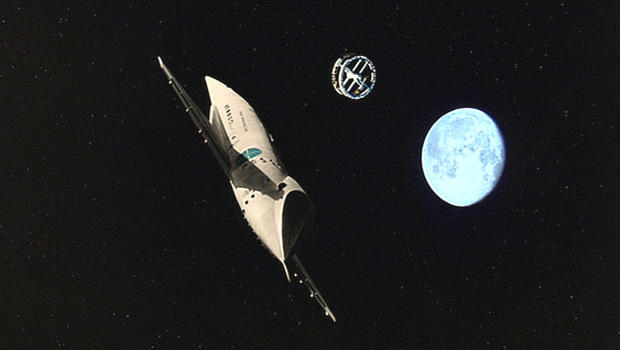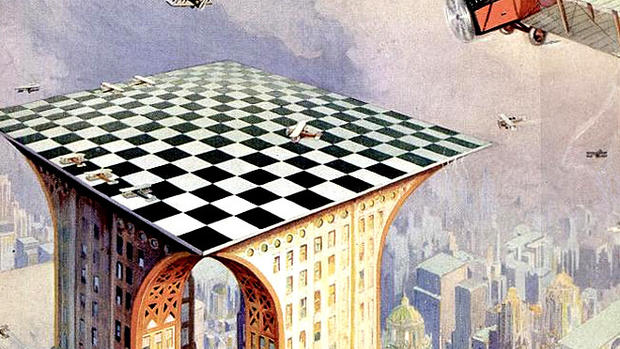The future isn't what it used to be
(CBS News) "Yesterday's tomorrow" was a wondrous place, full of amazing gadgets and technologies many experts told us were just around the corner. So why aren't we there yet? Our Cover Story is reported by Mo Rocca:
The world of tomorrow: Trains zooming from coast to coast via vacuum tubes . . . gleaming cities in the sky . . . and, of course, flying cars. That was what the future was supposed to hold for us.
"I grew up expecting to live on the Moon, to be able to travel in rockets," said writer and illustrator Ron Miller. "When '2001' came out, there was a future that looked really possible. So in 30 odd years we could probably have space stations, and passenger liners going to and from space stations, run by Pan Am!"
But Pan Am doesn't even exist anymore.
"I feel, in a way, I was promised this future, and it's never paid off," Miller laughed. "I'm not on the Moon. I've never ridden in a rocket. I haven't been to a space station. I don't have a flying car."
For all of his life, Miller has dreamed of exploring space. He's had to settle for imagining it, such as the vistas of the Red Planet.
"That's a desert on Mars," he showed Rocca in one painting. "Mars has these wonderful tornadoes all over the place, and usually you can see the track of them."
Architectural historian John Kriskiewicz got his first glimpse of that big, bright, beautiful World of Tomorrow when he visited the 1964 World's Fair in New York.
At five years old, Kriskiewicz wanted to live in this future -- a future that was already in progress.
"We were literally on our way," Kriskiewicz said."By the second season of the Fair in 1965, men had walked in space. We were seeing progress each year" - proof positive that the future was possible.
Fifty years later, a lot of the Fair's predictions weren't exactly spot-on, though it must be said, all those logos were a sign of things to come. One of the things the World's Fair got right was the domination of corporate sponsorship.
But wait a minute, we still don't have flying cars!
"We get this all the time: Where is my flying car? We were promised flying cars!" said James Meigs, editor-in-chief of Popular Mechanics.
Meigs says we could have flying cars right now, but the better question is, do we want them?
"It's such a great fantasy, such a cool idea," said Meigs. "Various ones have been built over the years. There's a company trying to sell some today that work. The problem is that cars and planes are so different. So what you end up with is a terrible plane that, once you land and try to drive around, is a terrible car."
Popular Mechanics has been predicting the future for 111 years now. A lot of times they nailed it.
In 1954 the magazine predicted a television you can hang on your wall -- the flat-screen TV. "It took a long time, but we finally got it," said Meigs.
A lot of times they fell short of the mark: how about mail delivery by parachute?
"Isn't that cool?" said Meigs. "The very early days of air mail people thought, 'Why shouldn't this go right to your house?' More or less feasible, if crazy."
Or vacuum tube-powered trains, that could get you from New York to San Francisco in an hour!
"It would be insanely expensive to build the infrastructure to do it,' explained Meigs.
And then there's the future we're lucky never happened. How about the House of the Future, where everything was more or less plastic? "Everything could be hosed down for convenience," said Meigs. "You wouldn't really do any cooking. Everything would come in frozen blocks that you would just heat up."
A lot of things we have today were conceived by science fiction writers, such as Jules Verne.
"In the 1880s he wrote a novel about a giant helicopter called the Albatross," said Miller. "When it came out in the 1880s, 1890s in Russia, a little kid named Igor Sikorsky read it, and he said, 'Wow, I'm going to grow up and build a machine like this!' And he did!"
Another Verne classic, "From the Earth to the Moon," inspired the seminal founders of modern astronautics: Hermann Oberth, Robert Goddard, and Wernher von Braun. "They all said they got interested in rocketry and the possibility of flying into space," said Miller.
And then there's the remarkable case of Murray Leinster, who published a short story in 1946 called "A Logic Named Joe" which imagined a machine called a Logic -- a kind of two-way television with a keyboard.
"You would use it to get news, communicate with your neighbors, but you could also use it for research because all logics were tied to a central computer," said Miller.
"And in the story, people are downloading things like plans for bombs."
It seems as if visions of the future tend to be more dystopian than utopian -- decidedly downbeat, like George Orwell's "1984," Ray Bradbury's "Farenheit 451," and a raft of apocalyptic blockbusters.
"Most utopias are boring," said Miller. "Dystopia's got to be more interesting, because everything goes wrong, and there's problems that are horrible, and you have to solve them, which doesn't take place in utopia [where] everything's already solved."
"Looking back, does it seem that people were more optimistic about the future than they are now?" Rocca asked.
"I think sometimes people were a little too optimistic in the past, and they're too pessimistic today," replied Kriskiewicz. "You know, we all walk around with the entire Internet in our pocket, in our phones. I mean it's incredible. Life expectancies have gone up. Disease has fallen around the world dramatically. The cars we drive, the homes we live in, are so much more efficient and safer and capable. We tend to really romanticize the past and catastrophize the present."
Such as Louis C.K.'s routine about people who complain and whine about the hardships of air travel:
" 'I had to sit on the runway for 40 minutes.' Oh my God, really? What happened then? Did you fly through the air like a bird, incredibly? Did you soar into the clouds, impossibly? Did you partake in the miracle of human flight, and then land softly on giant tires that you couldn't even conceive how they f****** put air in them? . . . You're sitting in a chair in the sky! You're like a Greek myth right now!"
"He's exactly right: people take amazing things for granted," said Kriskiewicz. "Like, 'My phone is so slow.' Wait, your phone is connecting you to the entire world!"
For more info:
- black-cat-studios.com (Ron Miller)
- "The Grand Tour: A Traveler's Guide to the Solar System" by William K. Hartmann and Ron Miller (Workman Publishing)
- John Kriskiewicz
- John Kriskiewicz, Parsons School of Design
- Popular Mechanics
- Louis C.K. (Comedy Central)

